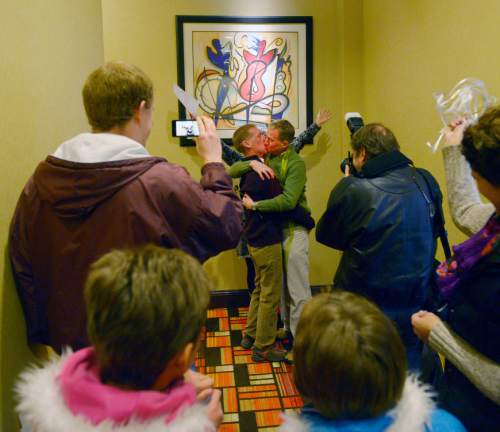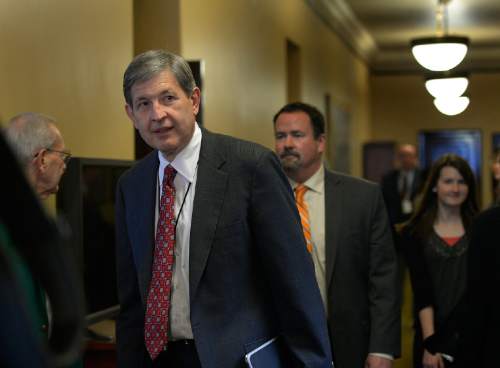This is an archived article that was published on sltrib.com in 2015, and information in the article may be outdated. It is provided only for personal research purposes and may not be reprinted.
Utah taxpayers spent about $1.2 million on what ultimately was an unsuccessful effort to defend the state's constitutional amendment banning same-sex marriage, legislative leaders were told Tuesday.
Dave Buer, a spokesman for the Sutherland Institute, a conservative Salt Lake City think tank, said the money was well spent.
"Spending a million dollars," Buer said, "to defend the most important building block of society was well worth it."
Troy Williams, executive director of Equality Utah, said, given the outcome of the case — "all Utahns enjoying the freedom to marry who they love" — $1.2 million was a small price to pay.
"Perhaps in the future we can better allocate tax dollars to fund education, improve the quality of our air and provide access to health care for our state's most vulnerable," he said. "Hopefully, we can now use our shared resources to bring Utahns together instead of perpetuating old divisions."
To mount its defense of Amendment 3 — which was approved by voters in 2004 and defined marriage as between one man and one woman — the state contracted with outside attorneys, led by Gene Schaerr, a prominent lawyer who left his Washington, D.C., law firm to take the case.
U.S. District Judge Robert Shelby ruled Utah's ban on same-sex marriage was unconstitutional in December 2013 in the case of Kitchen vs. Herbert. The following year, the Legislature appropriated $500,000 to hire the outside attorneys to handle the appeal. The state said at the time it was paying Schaerr $200,000 to handle the appeals.
In June 2014, the 10th U.S. Circuit Court of Appeals, after hearing Schaerr argue Utah's case, agreed with Shelby that Utah's amendment was unconstitutional. In October of that year, the U.S. Supreme Court declined to review the case.
Last month, the U.S. Supreme Court, in a separate case, held that marriage was a fundamental constitutional right for heterosexual and same-sex couples, making the practice legal in all 50 states.
Parker Douglas, chief of staff for Utah Attorney General Sean Reyes, said the state hired Schaerr, as well as John Bursch and, early on in the process, Monte Stewart, to help on the case. The rest of the work was done by attorneys within the office, including himself.
"The position of the office is: If a state law is challenged, we defend it, and it's not our job to second-guess that. It's up to the judiciary to tell us if they pass legal or constitutional scrutiny or not," Douglas said. "The case was either the case of the first quarter or half of the century, if not the case of the century. I don't think [the amount] is necessarily out of the ordinary, and I don't think the costs were exorbitant, given the nature of the case."
In addition to being paid by the state to defend Amendment 3, Schaerr was hired as a fellow by the Sutherland Institute.
Any compensation he received from the institute is apart from what he was paid by the state. Buer, the organization spokesman, said Schaerr researched and wrote policy papers for the institute.
"Sutherland does not disclose the details of financial agreements it makes with contractors or employees," he said.
Legislative analysts said the $500,000 initially set aside was enough to nearly cover the cost of the outside attorneys, but it didn't pay for about $674,000 in expenses and time spent on the case by lawyers within the attorney general's office.
All told, the price tag ran to $1.17 million, for a case that legislative analysts said was defended appropriately, but unsuccessfully. In addition to the report on the state's marriage defense, legislative leaders were told Tuesday that, so far, the state has spent only about $65,000 of the $750,000 budgeted to process a backlog of about 1,200 rape kits.
The Department of Public Safety contracted with a company from Texas to test the kits and began sending them for processing in November. So far, 300 have been sent but only about 98 have been fully processed and paid for.
The department expects to send about 200 kits every month and have all the kits submitted for processing by year's end.
Twitter: @RobertGehrke





